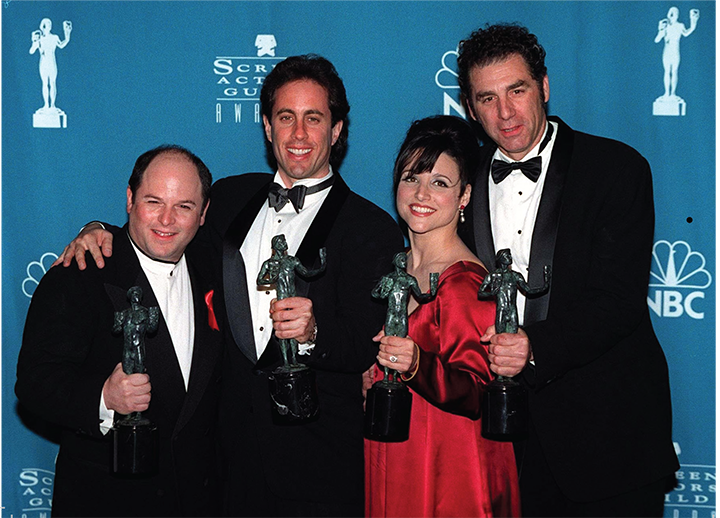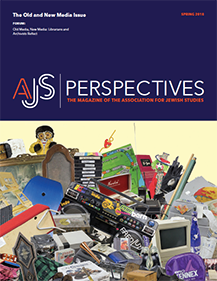
There is no disputing that “Jewish control of media” is the stuff of racist conspiracy theories. The Protocols of the Elders of Zion represented Jewish control of the press as a means toward broader domination. While some American newspapers such as the New York Times have had Jewish owners, outlandish concerns about Jewish influence have been prompted more by Hollywood and broadcasting becoming major institutions of modern life. The new movie studios and networks were run largely by Jewish immigrant moguls or their offspring: the Warner brothers, Adolph Zukor (Paramount), David Sarnoff (RCA/ NBC), and William S. Paley (CBS), among others. Both news and entertainment remain fields hospitable to Jewish artists and businesspeople, from CEOs like Bob Iger (Disney) and producers and company presidents like Jeff Zucker (CNN, NBC) to writers and directors like Nora Ephron and Steven Spielberg. Jewish journalists have led the most influential news organizations in the United States, including the Times and Washington Post. Jews are heavily represented in creative and media workplaces and occupy many positions of prestige and authority.
In a society in which Jewish identity exists in tension with gentile whiteness, Jewish power over media has been a source of as much anxiety as celebration. At certain moments, notions of Jewish power operating behind the scenes have surfaced, revealing currents of antisemitism in the American mainstream. The postwar House Un-American Activities Committee hearings resulted in the blacklisting of Jewish writers, including six of the Hollywood Ten accused of communism, which was a veiled antisemitic condemnation. In response to such moments, media powers have sought to downplay their Jewishness, as when the Hollywood moguls hired Will Hays, an Indiana Protestant from President Harding’s cabinet, to lead their trade group and be their public face during a period of scandal and censorship in the 1920s.
The canard of Jewish media manipulation is often linked with conservative suspicion that advancing left politics is an unacknowledged agenda of journalism and popular culture. Ed Asner, the star of Lou Grant, president of the Screen Actors Guild, and political activist, raised money for victims of El Salvador’s US-backed junta in the early 1980s. Not only did CBS cancel his show, but Asner was called a communist swine, reviving associations between Jews and the Old Left and echoing the chilling politics of McCarthyism.
Similar associations often arise when politicians scapegoat the media. While gearing up for his 1996 presidential run, Bob Dole gave a speech calling out the entertainment industry for its promotion of violence in rap music and action movies. The Jewish columnist Frank Rich shot back at Dole for singling out Time Warner—then run by a Jewish CEO, Gerald Levin—while overlooking similar products of Rupert Murdoch’s News Corp. Rich quoted coreligionist Billy Crystal: “Every time they say the phrase ‘Hollywood elite’ you can hear the unspoken word ‘Jew.’”
More baldly Jew-hating rhetoric has only become easier to observe with the rise of online platforms. A Reddit user who posted a video of Donald Trump beating a man with a CNN logo head, which Trump tweeted in July 2017, had earlier posted an image of portraits of CNN’s Jewish employees with blue Stars of David superimposed on each, under the caption “Something strange about CNN . . . can’t quite put my finger on it.”
The Jewishness of media creatives historically has been tamped down in their work, often ignored and occasionally coded in terms invisible to the non- Jewish world, just as their names were often Americanized. Jewish artists are responsible for some of the entertainment industry’s most iconic symbols of “universal” Christian culture, like Irving Berlin’s nostalgic “White Christmas” and Johnny Marks’s “Rudolph, The Red- Nosed Reindeer.” While obscuring their cultural identity, Jewish artists created a fantasy of wholesome Americanness.
In the 1970s, Jewish creatives were responsible for television’s biggest hits, including the new wave of “quality” comedies that brought left-leaning perspectives on social issues to the typically politics-averse small screen. Central to this moment was Norman Lear, well known as both a liberal and a Jew. His hit series All in the Family was based on both a British predecessor and Lear’s own family. Archie Bunker, a bigoted, working-class white man, was a de-ethnicized version of Lear’s father, just as the liberal, feminist protagonist of spin-off series, Maude, was modeled on Lear’s wife, Frances. Lear pioneered a new style of socially engaged, hotbutton storytelling in American TV, but some characters were whitewashed.
Jewish characters created by Jewish writers would appear occasionally in the 1970s and ‘80s. Ed Zwick and Marshall Herskovitz identified thirtysomething hero Michael Steadman as a nonobservant, intermarried Jew. In the season 4 premiere, “Prelude to a Bris,” Michael grapples with his heritage in light of his newborn son’s arrival. Across most of thirtysomething, however, Michael’s Jewishness is subsumed within his identity as a liberal yuppie, emphasizing commonality with gentile friends, Elliot and Gary, who share Michael’s angsty sensibility. While this character was a closer match to its authors’ identities than were Lear’s creations, Michael’s Jewishness was usually peripheral to the story.
Over time, Jewishness has occupied a more prominent place on American screens, albeit still a conflicted one. Most notably, on Seinfeld, Jerry was marked as Jewish but none of the other members of his friendship quad were. Jerry, Elaine, George, and Kramer may have exhibited stereotypical markers of Jewishness in their neuroses or their penchants for intricate interpretations of everyday life, but the most obvious characterizations of comedic Jewishness were embodied by George and his overbearing parents, Frank and Estelle Costanza, explicitly represented as Italian Americans. The refusal to name these (exaggerated and stereotypical) characters as Jewish may have been as much a winking in-joke as an evasion. Years later, Jerry Stiller (Frank) ribbed that the Costanzas were a Jewish family in a witness protection program, suggesting that their coded ethnicity was a comedic jab at a long history of invisibility. For decades, Jews have defensively minimized attention to off-screen Jewish artistic vision and economic power, taking pleasure in their success while also taking care not to alienate the American mainstream.
While the position of Jews in the media has changed little in the twenty-first century, the fragmentation of the digital mediasphere has the potential to multiply Jewish representations, to engage with Jewishness in ways less feasible under a more mass-targeted system. Jill Soloway’s Amazon series Transparent has offered a more culturally specific encounter with Jewish identity than has ever been seen in American television. Shielded by its presence on a narrowly targeted streaming platform, as well as its more public and visible engagement with transgender experience, Transparent signals the potential of creative voices to engage with Jewishness in deeply revealing ways. That it comes along a century after the moguls “invented” Hollywood and its fantasy version of white America is a testament to an abiding ambivalence about media Jewishness.

